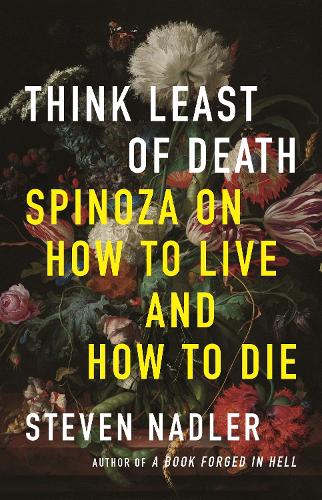
Think Least of Death: Spinoza on How to Live and How to Die
(Paperback)
Available Formats
Paperback
Published: 1st December 2020
Hardback
Published: 1st December 2020
Paperback
Published: 18th July 2022
Publishing Details
Think Least of Death: Spinoza on How to Live and How to Die
By (Author) Steven Nadler
Princeton University Press
Princeton University Press
18th July 2022
United States
Classifications
General
Non Fiction
Philosophy: metaphysics and ontology
Philosophy: epistemology and theory of knowledge
170
Physical Properties
Paperback
248
Width 140mm, Height 216mm
Description
From Pulitzer Prize-finalist Steven Nadler, an engaging guide to what Spinoza can teach us about life's big questions.
In 1656, after being excommunicated from Amsterdam's Portuguese-Jewish community for 'abominable heresies' and 'monstrous deeds,' the young Baruch Spinoza abandoned his family's import business to dedicate his life to philosophy. He quickly became notorious across Europe for his views on God, the Bible, and miracles, as well as for his uncompromising defense of free thought. Yet the radicalism of Spinoza's views has long obscured that his primary reason for turning to philosophy was to answer one of humanity's most urgent questions: How can we lead a good life and enjoy happiness in a world without a providential God In Think Least of Death, Pulitzer Prize-finalist Steven Nadler connects Spinoza's ideas with his life and times to offer a compelling account of how the philosopher can provide a guide to living one's best life.
In the Ethics, Spinoza presents his vision of the ideal human being, the 'free person' who, motivated by reason, lives a life of joy devoted to what is most important-improving oneself and others. Untroubled by passions such as hate, greed, and envy, free people treat others with benevolence, justice, and charity. Focusing on the rewards of goodness, they enjoy the pleasures of this world, but in moderation. 'The free person thinks least of all of death,' Spinoza writes, 'and his wisdom is a meditation not on death but on life.'
'A helpful explication of [Spinoza's] ideas about ethics, the afterlife, and human nature.' Kirkus Reviews
Reviews
"Aiming to extract life lessons from the philosophy of Spinoza, this vibrant study focusses on the concept of homo liber, or the free person, a supremely rational figure continually striving for power and virtue. . . . Spinozas work serves as a hopeful, timely statement of what the truth-seeking individual can accomplish." * New Yorker *
"As an accessible introduction to the complex thought of Spinoza, it is a success."---Jeffrey Collins, Wall Street Journal
"If you want to become a better person, you ought to study the philosophy of Baruch Spinoza. That at least is the message of Steven Nadlers delightful new book."---Jonathan Re, Literary Review
"A helpful explication of [Spinozas] ideas about ethics, the afterlife, and human nature." * Kirkus Reviews *
"If you want the clearest and most sympathetic introduction as exists to Spinozas ideas . . . then Nadlers your man. This, his latest book, is a must-read for our present, troubled times."---David Conway, Jewish Chronicle
Author Bio
Steven Nadler is Vilas Research Professor and the William H. Hay II Professor of Philosophy at the University of WisconsinMadison. His many books include Rembrandts Jews, which was a finalist for the Pulitzer Prize, Spinoza: A Life, and (with Lawrence Shapiro) When Bad Thinking Happens to Good People: How Philosophy Can Save Us from Ourselves (Princeton).
